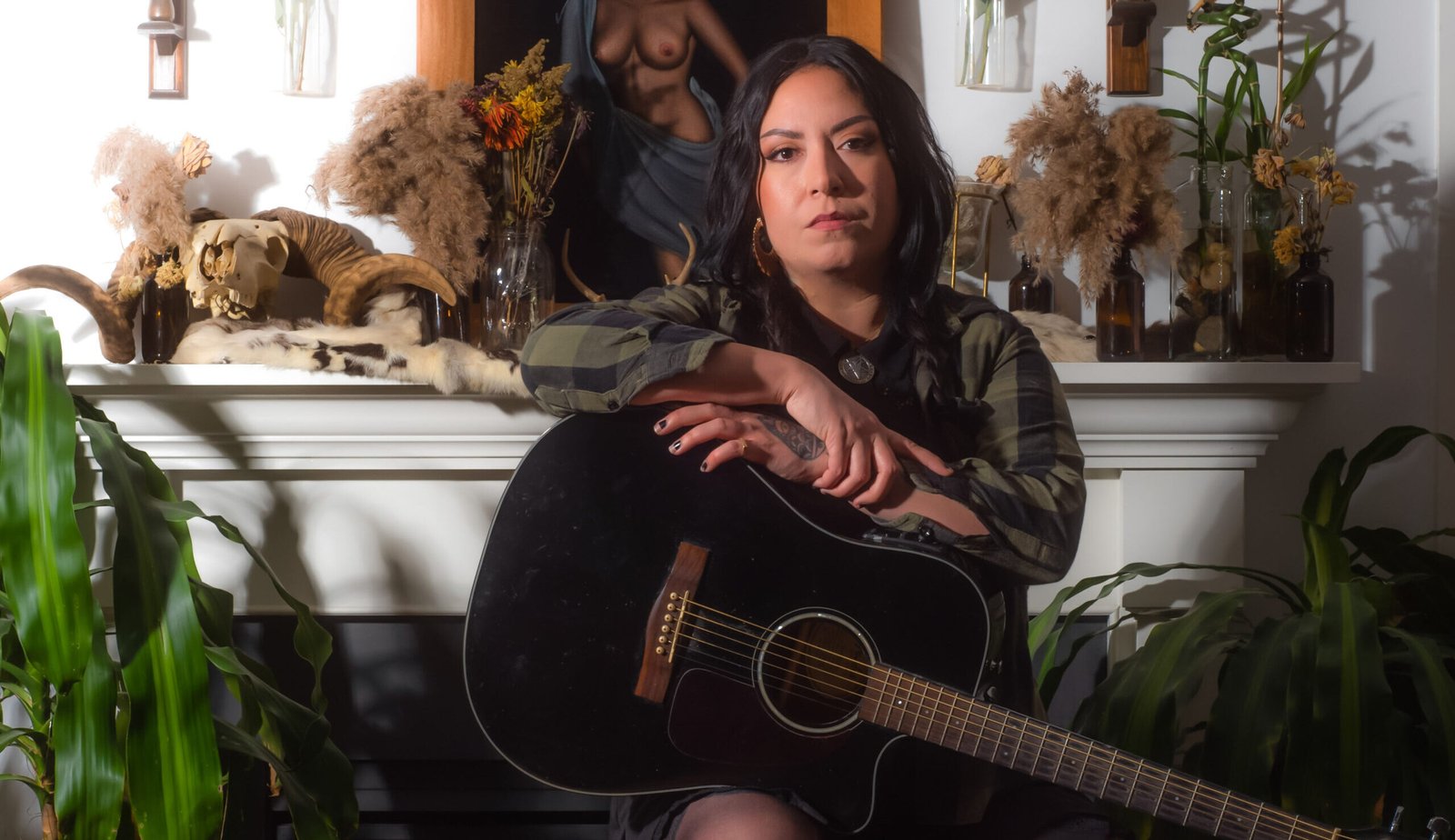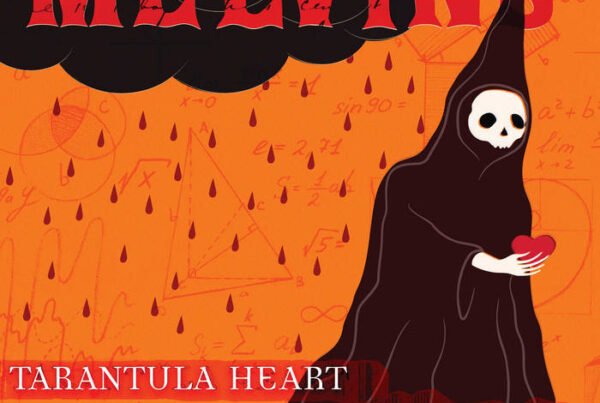Dorthia Cottrell is really one of a kind, able to captivate audiences from a number of angles. You probably know her as the singer of the doom metal band Windhand, but did you know she has a budding, outrageously good solo career as a folk artist as well? She only had a self-titled LP from 2015 to her name which was astonishing enough, but now she rolls in on a black horse to deliver Death Folk Country, an album named not only for the musical styles and moods it melds together, but to encapsulate Cottrell’s own multifaceted, complicated life. Of course, I had to bring my pal and resident folk enjoyer Jake along with me to discuss what a treat this is. All I can say is have an open mind if you’ve never heard this before.
David: Jaaaaaaaake, it’s that time again.
Jake: Daviiiiiid! Let’s do this! How stoked are you to get into some folk death folk? I’d say normally that answer is pretty predictably no, but given that it’s Dorthia Cottrell we’re talking about that changes things, yeah?
D: You know, any other time, I’d wince with the knowledge and self-awareness that folk isn’t really my thing with very, very few exceptions. Dorthia Cottrell is one of those exceptions for sure. I found her through Windhand of course, the Virginian doom-ass doom metal band that’s overdue (overdoom?) for a new album, but in checking out her solo stuff, I was absolutely enraptured as well. Naturally, I was pretty hype for her album here, Death Folk Country. You’re much more into the folk and country atmosphere than I am so I’m curious to get into what your take is with it and how you digest it maybe relative to other works in this genre.
J: I know that’s right. I knew the Windhand pull as well as some of the music that I’m certain you’ve enjoyed over the last few years from acts like Chelsea Wolfe and to an extent some of the material that Lingua Ignota has put out, you’d be at least interested. For me, yes squarely in my wheelhouse and given the fact that she calls my state home is even cooler. I love getting to artificially claim bands like that. So when it comes to the title of the album, I almost get the feeling that she’s sort of defining this little niche genre that this sound gives off. Death, Folk, Country. What a collective of ideas. That being said, where should we start?
D: I totally agree with the genre. Death Folk Country isn’t just a name, it’s a style that feels uniquely hers. I think it’s a fine enough place to start by going over the overall feel of this album. Cottrell really rides similar moods and tones throughout all of it, but there’s little changes here and there like how “Midnight Boy” is a bit more upbeat and lively. I read the bio that accompanied this album and it really goes into how this album is such a distillation of Cottrell’s life in rural Virginia, the beauty of it, her internal relationship to it, and more. In that sense, it’s a monument to her life lived there – growing up goth, wrestling an ever-present melancholy that comes with the surroundings – it’s all in each strum of her guitar and sung note.
J: Yeah I read that too and in some ways it’s quite visceral to me in a real way, both in the abstract and as well as some of the specifics of how her life took shape. There’s a real melancholic atmosphere layered on this record and I think that comes across quite visually to me. “Harvester” is really where that kicked off in earnest for me: the slight strings, minimal rhythm section, and morose harmony just feels like an aching dusk winding down a day of bad news.
D: Fuck, I love that song. Such a great start to the album (after the short intro track). I totally got that dusk feel from it too, just sitting on a porch alone, the sun retreating as if it was fed up with the day as well, and all you have is the wind and yourself. Still, there’s this routine that keeps you going, a bigger feat to face and I love how the lyrics encapsulate that – ‘So let it pour down on the valley/Pray for rain/’Cause it’s gonna be a long winter/And I’ve got to harvest my grain’.
And if that’s the dusk, I think the next song, “Black Canyon”, is the dawn. It’s still dark, still morose, but it’s an absolutely beautiful song in execution, personifying the canyon as this alluring, life-giving entity that Cottrell has this spiritual kinship with. It reminds me of the way our Indigenous people fiercely protect the land and water from violation and oppressive ownership, showing this symbiotic relationship where the land cares for them and so in turn they care for the land. I don’t know if Cottrell has that sort of specific connection or commitment, but regardless this is truly awesome. Some of my favorite lyrics of the whole album are here, like ‘Oh blessed black canyon/How deep are your caverns and wide/I’ve found that most people have something similar inside’.
J: Yeah I love the connection that she makes there and drawing parallels between the land and our emotional landscape. I love that you had the visual connection with the record too, I find it pretty powerful that an album that we’ve both listened to independently and not discussed at all could conjure these sorts of things from within us. As an artist, I know that’s what I would want. Going back to “Black Canyon” and the analogy that she makes to how we are inside, I get the feeling that in some ways this lyric and song point to what the album explores. It’s a bleak and dark set of songs that touch on loss, avarice, and consequence. While all this is heavy and the sonic accompaniment is apt, there’s still an evil grin – not unlike the one from the album cover – through it all. It’s such a cohesive array of topics paired perfectly with the weight of acoustic doom.
D: That’s the absolute one critique I had with the album – the cover feels off for it. I think I get what she was going for, but I could’ve done without the monstrous touches because they almost feel cheap and this music is anything but. Still, I get it – this album is dark, every song feels like a ghost story of sorts, a vignette of a time or place lost to history yet still contemporary. It almost feels like transcending realms to me, probably because the life Cottrell has lived is so different from mine. That’s what makes it so alluring to me.
Getting back to specifics though, how did you feel about the “Family Annihilator” video when it dropped?
J: Fair point about the cover! Anyway, yeah I think that video had the right amount of unsettling imagery for the song title and some of those lyrics are just haunting and achingly impossible to deal with on an emotional level: ‘I will hold your baby pass her over here to me / Yes I will hold your baby take the reins / Who will bring a shovel for to dig untimely graves?’ Big yikes. This whole song felt like a script to one of those A24 horror movies that just gnawed away at you because you could see the end coming but couldn’t look away. Frankly that’s a lot of this album and I’m pretty okay with that. I think to some extent there isn’t a lot that surprises me about this record. The mood, the lyrics, the atmosphere, it’s very much as advertised. That is not a demerit in my opinion. Writing like this at this level and making all of these disparate pieces work together feels like a task that only elite musicians could pull off. To me this feels like a collection or anthology that has one thread that connects every moment making the entirety of Death Folk Country feel like one lengthy composition.
D: Yeah, horrendous A24 energy, that’s a great way to put it. Death Folk Country always seems to have this specter of death over it so it’s cool the video for the song went pretty hard with the imagery and lyrics – poetic, yet deeply foreboding.
To gush one more time, I’m just in awe of it all. You’re pretty spot-on, there’s a way to interpret the whole album as one piece, one anthology, to the point that it qualifies for world-building and painting that gritty, dust-encrusted picture of Virginia that I can’t personally reference, but feel a connection to just from how well Cottrell executed the music. There’s real heart and soul entwined in every note, and for as much as I felt connected to Windhand’s music, this is a whole other level – more personal, more vulnerable, but still touching on those dark tones that I love.
J: It’s hard to agree more.
As a testament to how great this album is and the emotions that get conjured up by Dorthia on this record, you and I couldn’t have more different perspectives when it comes to this style and the locale on which it is based. I love folk and country and I’m from Virginia. Your story couldn’t be more different. Yet here we are agreeing that Death Folk Country is a mesmerizing triumph that pulls from every dark corner of human existence but still finds beauty in all of the blood and guts. That speaks volumes and gallons. I think this will be one of the standout moments of the year for me and while the mood for it has a narrow point of entry, it’s a singular experience.
D: Totally. I think in the end, I just love how human it feels, yet it’s not insular. I’ll always be intrigued with art that approaches itself from those sorts of angles, genre be damned. To end, I’ll just say thank you to Dorthia. If she reads this, I hope she can feel how much she’s affected us – two different humans – to the core. Love this album.
J: I love it too. One of these nights I’ll sip absinthe on my porch while holding a guitar and scythe. I think that’s the right mood. For now, I’ll just imagine it.
Artist photo by Richard Howard






